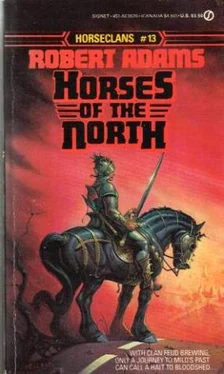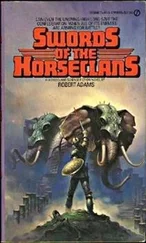The red-haired young man wrinkled his brows. “Well, Uncle Milo, we could try both of your ideas. Follow the beast as far out as we can, then carry on with the hunting, set up an early camp and make sure to be here around sundown, which was when it last came here, when these prints were impressed in this mud.”
Luck was with them—they found the object of their search only a mile or so distant, a solitary bovine of impressive proportions. Milo had seen gaur, kouprey, bison and wisent, African and Asian buffaloes, and he had never before set eyes to any bovine of the height or apparent weight of this bull.
The creature was a ruddy-brown-black, with a shaggy hide a bit reminiscent of the bison or wisent. Also akin to those beasts, it had a sizable hump of muscle atop its shoulders, which gave it an overall height at the withers approaching seven feet, Milo reckoned. He also reckoned that figure to be about the span from tip to wicked tip of its shiny-black horns. Although the body was thick and deep-chested, it was held well up off the ground on long legs. The animal gave an impression of immense strength and lightning speed, and the old scars furrowing his hide showed that he must embody immense vitality to match that strength.
Had it been up to Milo alone, he would have left the tough old warrior where he grazed and sought out less deadly-looking prey. But in the minds of the other hunters, there was never any question as to whether or not to slay the gigantic bull, for not only were wild bulls an ever present danger to their herds of cattle, this black bovine represented significant quantities of meat, hide, horn, sinew, bone and hooves, not to mention the inevitable glory and prestige of having taken part in the slaying of so unusual and massive a quarry.
However, none of them being of a suicidal bent, they planned the attack with great care, eight men being none too many to try to put paid to so big an animal. The big question, of course, was whether the bull would make to flee or choose to fight where he stood. Both eventualities must be foreseen and covered in contingency plans.
At last, starting far, far out on all sides, they rode very slowly toward the bull, two with bolas ready in case the beast tried to run, the rest bearing bows, nocked arrows and spare shafts between the fingers of the bowhand. None had even thought of trying to ready or use lance or spear, for the beast clearly had too much power for any man and horse to hold on a lance, and no one wanted to get close enough to put a spear into him until he had been seriously hurt by some well-placed arrows.
The monstrous black bull raised his massive head several times, turning it here and there to test the vagrant currents of air, the long, long horns gleaming in the prairie sunlight. And each time that he did so, Milo’s heart seemed to skip a beat or two, but each time, the bovine went back to grazing the grasses among which he stood. And the eight men rode closer, closer, and ever closer. Already, one or two had come to within extreme range of their bows.
But then the shaggy bull raised his great head yet again, and this time he did not resume his grazing, but stood tensely while he tested the air, then bellowed an awful, bass challenge and began to paw at the ground.
The huge wild bull was clearly on the very verge of a charge, which Milo knew could mean one or more deaths of hunters and/or quite possibly the escape of the beast. He thanked his stars that all seven of his companions on this day were mindspeakers, then silently beamed his message to them.
“I doubt that he can see any better than any other kind of cattle. He seems to be dependent on scent and sound, so let’s be wolf-wily. Those of you behind him make noise. When he turns, you be still and let those then behind him make noises; in this wise we may be able to keep him confused enough to all get within killing range. But when he does charge, don’t any of you try to show how brave you are—get the hell out of his way, if you can. Big as he is, he could likely toss a horse with those horns, and one of you on that horse.”
Milo reflected that they should have brought some bigger hounds, which could if nothing else have given the monster something to occupy his mind and energies until the men were all in killing range. But he had never really liked hunting with dogs, and besides, who would ever have thought that the party would chance across so singular a beast as this brown-black mountain of muscle and bone and sinew?
In the end, no man or horse was lost or even hurt. Thanks to Milo’s wise counsel, the great bull was never able to make up his mind just which way to charge until it was become far too late for him. One bola and then a second flew, spinning to enwrap those tree trunk-thick rear legs, then the bowmen came swooping in at a hard gallop from either side of the roaring, struggling bovine, to drive their shafts nearly to the fletchings in the heaving, shaggy sides.
When bloody froth began to spray from the bull’s nostrils, two horsemen risked riding in close enough to hamstring both the near and the off rear legs, then Milo dismounted and dashed forward, burying the six-inch razor-edged head of a wolf spear in the bull’s throat, neatly severing the great neck artery.
Walking, leading horses burdened with the butchered bull, they were very late in returning to the camp, but there was nonetheless tumultuous rejoicing, for no one of the Horseclans folk had ever seen the likes of the massive kill, which equaled or bettered the total in edible meat of all the other beasts slain by the hunters.
The tanning hide and the oversized horns of this particular kill were a wonder to all who got to see them, Horseclansfolk or the other nomads alike. At the feast, Chief Gus Scott and his subchiefs wondered and exclaimed over the trophies repeatedly.
“It’s all shaggy, like a buffler, ’bout the color of one, too. But who ever seed a buffler hide thet big, huh? And who ever seed horns like them on any buffler? How tall you say he stood, Chief Milo?”
“Between six and seven feet at the withers, Chief Gus, not counting that hump of muscle and cartilage. I’ve never seen any bovine just like him before. I was hoping you and your folk might be familiar with the breed—could tell me something of them and warn me of how prevalent they are, hereabouts.”
The Scott chieftain just shook his shaggy head.
“Not me, mister. Iain’t never seen no critter like thet, not out here on the prairies, nor neither on the high plains. Mebbe hecome down outen the mountains? I dunno, but I’m sure glad you and your mens kilt the big bastid is all. The less of his kind a-roaming ’round about here, the better.” His subchiefs grunted assent and nodded, fingering the wicked tips of the two yard-long horns. “B’cause thet would be a whole helluva lot of he-cow to have a-coming after you.”
In the days between the kill and the feast, Milo had had few spare moments to devote to pondering, but those few he had given to trying to imagine just how so singular a creature as the massive ungulate they had slain might have originated. Although his appearance was that of a man in his mid-thirties, Milo Morai was, at that time, a very old man—he himself did not even know exactly how old, but at least something above two full centuries—and his memories spanned a period from the 1930s to the present, through all the vicissitudes that had afflicted and at least nearly extirpated the races of mankind, killing untold millions in a few, terrible months by starvation and rampant, uncontrollable diseases, a few of these new, but most old.
If the areas of what had been the United States of America and the Commonwealth of Canada were a fair example of the rest of the world, eighty to ninety percent of humanity had been brutally exterminated by various causes in the wake of the brief, horribly destructive spate of hostilities between the allied powers of West and East power blocs.
Читать дальше












